

Discover more from The Cottage
On Easter Sunday, a friend sent a text wishing me a good holiday. To the greeting, he attached a link to the 1974 song, simply called “Easter Song,” from Second Chapter of Acts, one of the original bands in a genre of music that would eventually become Contemporary Christian Music. I clicked the video:
Hear the bells ringing, they're singing
That we can be born again
Hear the bells ringing, they're singing
Christ is risen from the deadThe angel up on the tombstone
Said He has risen, just as He said
Quickly now, go tell His disciples
That Jesus Christ is no longer deadJoy to the world
He has risen, hallelujah
He's risen, hallelujah
He's risen, hallelujah, hallelujah
I started singing. I hadn’t heard that song in four decades. But I knew those crystalline notes, every lilting word. And, as I sang, I was verklempt. It wasn’t because of Easter or Jesus or some spiritual experience. It was sheer nostalgia.
I remembered when I first heard that song as an evangelical teenager in the 1970s at a Christian rock concert. I owned the album and would blast it full volume on the record player, belting out all the high notes along with the lead singer. At the evangelical college I attended, everybody had the same record and it wasn’t unusual to walk across campus and hear the song coming from multiple rooms in more than one dorm.
It was part of the soundtrack of those days for young evangelicals, with its admixture of hope, pathos, and triumph. Christian music wasn’t so sappy then; it was edgy. The first tracks of Christian rock often criticized power and conventional religion, warned of false prophets and profits, and extolled Jesus as political guy who cared about Vietnam and dictatorships in Latin America. (I’m not kidding. There were reasons why evangelical parents and preachers didn’t like Christian rock.) These were the lyrics of the before-times. Before Jerry Falwell. Before Pat Robertson. Before the Moral Majority and the religious right. Before it all. When evangelicalism was radical and our heroes founded alternative communities, joined protest movements, and embraced liberation theologies.
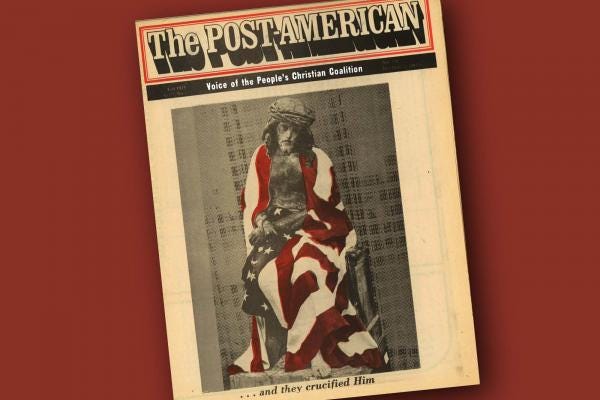
And I started to cry. Not only for the years past, but for the present. “It could have been different,” I mused out loud. “It didn’t have to wind up like this.”
********
While I was listening to the “Easter Song” this past weekend, Donald Trump was in the middle of a post-storm on his Twitter-like site, Truth Social. On Easter, he posted 77 separate “truths” (that’s what they call the individual posts on the site, no matter that those posts bear no resemblance to truth) attacking his enemies, lying about his opponents, and threatening judges, lawyers, prosecutors, and their families with violence.
But that wasn’t all. He also posted several stories claiming miraculous backing for Trump’s candidacy, that he is “the Chosen One” and likening his legal troubles to those of Jesus’ crucifixion. It was a barrage of messianic mania, post after post of divine delusion. Vanity Fair, a publication not noted for its theological sophistication, referred to it as “Donald Trump's Impious Easter Sunday.” Their story opened with this:
If it were just Vanity Fair railing against Trump, well, that would be one thing. But it isn’t just elites making stuff up to shame conservative Christians. The media is not misrepresenting evangelical views. It comes from evangelicals themselves — they embrace the theology of Trump the Savior, a new political Jesus. They believe it. They believe that Trump is being sacrificed for them.
The most telling part in this video is the opening interview with two evangelical voters. They clearly understand the Bible and evangelical views of salvation — you could hear these verses quoted and this theology expressed on any given Sunday (or Wednesday night Bible study) in any evangelical church in the United States. They don’t get the theology wrong.
And then they apply it to Trump:
Man: “THE BIBLE SAYS HE WAS WOUNDED FOR OUR TRANSGRESSIONS. HE DID IT FOR US. WHEN TRUMP IS FACING ALL THESE THINGS IS HE DOING IT FOR US IN OUR PLACE.”
Woman: “JESUS DIED FOR MY SINS. JESUS DIED FOR ME AND SO I — IT CONNECTS IN MY BRAIN THAT WAY. LIKE, HE IS DOING THIS FOR US AS A COUNTRY TO MAKE THE CHANGES WE NEED TO MAKE AND HE IS THE TARGET WHERE WE DON'T HAVE TO BE.”
On Easter Monday, the New York Times published Michael Bender’s “The Church of Trump” (gift article link is good for 30 days) about how Trump has deployed more explicitly religious messages and rituals at his rallies. Many people wear “Jesus is My Savior/Trump is My President” shirts. A new red hat reading “Trump Save America” has replaced some of the older “Make America Great Again” caps.
We will pray to God for our strength and for our liberty. We will pray for God and we will pray with God. We are one movement, one people, one family and one glorious nation under God.
— Donald Trump
Last year, I wrote about the subtlety of Trump’s messianic self-understanding. But the religious nature of Trump’s campaign has come into focus and intensified in recent months. Robert P. Jones highlighted this shift writing about Trump’s address to the National Religious Broadcasters a few weeks ago: “In his rambling 75-minute speech, Trump delivered his most thorough articulation of his vision of white Christian nationalism to date.” In it, he made specific promises to evangelicals (it is worth noting that Trump actually kept his political promises to evangelicals during his tenure) including installing them as leaders in every federal agency, “defeat the toxic poison of gender ideology,” and gut public schools.
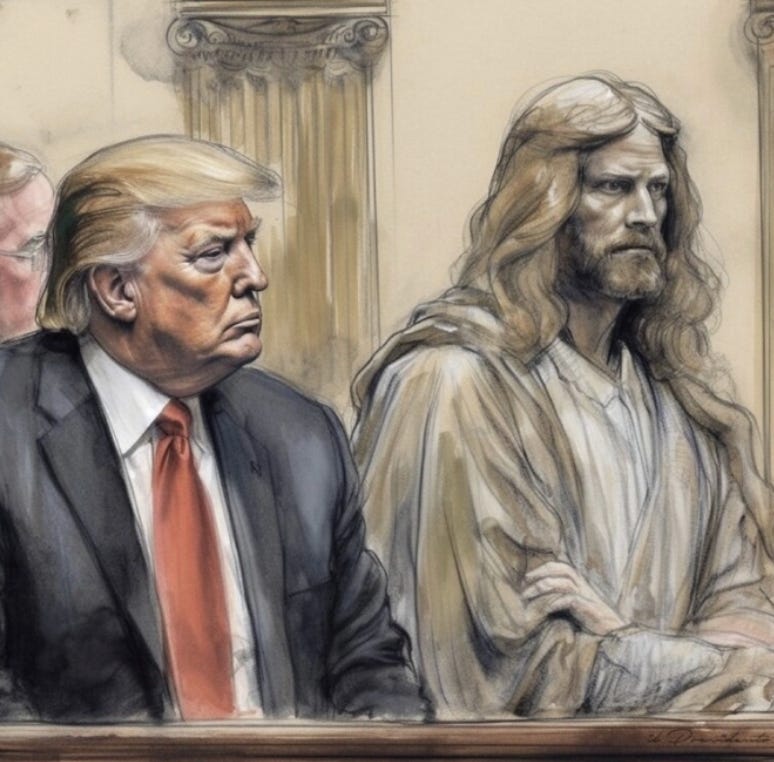
For a time, evangelicals tried to maintain a line between Trump and Jesus. But the theological line is getting thinner, razor thin. As Trump recently claimed in a speech, “I'm being indicted for you.”
This is the substitutionary atonement theory of Donald Trump.
And it is heresy. Maybe even idolatry.
**********
During Holy Week, I watched the new Netflix series on Moses (it features serious scholars — including Cottage favorite Pete Enns. I learned some things!) and the old classic (and cheesy) movie, The Ten Commandments. One scene stood out to me in both — the story of the golden calf.
The films prompted me to go back and re-read Exodus 32, the biblical account of how the Hebrew people got tired and worried when Moses disappeared for forty days on Sinai and demanded a more responsive god for themselves. They enlisted Aaron, Moses’ own brother, in a scheme to make a new god, an invitation he appeared to willingly accept. He fashioned both a calf-idol and an altar from gold. When he was finished, the people threw a wild pagan festival to worship the calf.
Exodus 32 is downright frightening — and neither the series nor the movie capture the full horror of the episode. Aaron, who had been so faithful to Moses while in Egypt, capitulated quickly to the crowd, to the point of directing them to surrender their gold and ordering the religious ritual to celebrate the new god.
When Moses finally returns, he asks his brother the most predictable question in the entire Bible: “What did this people do to you that you have brought so great a sin upon them?” Aaron, why did you let this happen?
Aaron replied:
“Do not let the anger of my lord burn hot; you know the people, that they are bent on evil. They said to me, ‘Make us gods, who shall go before us; as for this Moses, the man who brought us up out of the land of Egypt, we do not know what has become of him.’ So I said to them, ‘Whoever has gold, take it off.’ So they gave it to me, and I threw it into the fire, and out came this calf!”
This didn’t go over well with either Moses or God. Most people familiar with the story know the punishment — wandering for forty years in the wilderness. But most readers — me included — conveniently forget the first, most immediate punishment. After Aaron refuses to accept responsibility, Moses directs the men of the tribe of Levi to kill their own people: “The sons of Levi did as Moses commanded, and about three thousand of the people fell on that day.” Moses then announced, “Today you have ordained yourselves for the service of the Lord, each one at the cost of a son or a brother, and so have brought a blessing on yourselves this day.” People in the tribe of priests were ordered to sacrifice their own kin as atonement.
Ah, we didn’t read that part in Sunday school.
Basically, this is a story about a people who get politically restless because they don’t get what they want fast enough and who enlist even formerly good leaders into creating a new religion while some of them remain silent and just go along. When the whole gang gets caught, they respond, “We don’t know what happened! We just threw gold on the fire and this calf came out!”
And really bad stuff happened as a result — really bad — for an entire generation to follow.
It is obvious what should have happened. Aaron should have said no. He could have even waffled a little: “This doesn’t seem like a very good idea. Maybe we should wait a couple more days…” It doesn’t matter that he might have been afraid of the crowd, worried he was going to lose his position in the community, or thought that Moses might have died. Aaron should have said no. Had he said “no,” the entire story would have been different.
He should have been the leader he had been to that point — and inspired others to say no as well.
Exodus 32 is a tale about the politics of idolatry. It is also a story about leadership and complicity — and the dreadful consequences that result when leaders fail to speak up to what is clearly a dangerous or stupid idea.
"How did this happen? Moses asked. “What did this people do to you that you have brought so great a sin upon them?”
“I don’t know,” Aaron replied. “It just sorta happened. I didn’t want them to get more upset then they already were. I went along with them. I didn’t see any harm in giving them want they wanted.”
**********
Donald Trump isn’t just about politics anymore (if ever he was). This is about religion and, very specifically, a profound corruption of Christianity that is now clearly heretical, if not idolatrous.
I have many colleagues and acquaintances who have spoken out with clarity and urgency since Donald Trump rose to power. But, as a rule, mainline churches have been shy to address Trumpism: We don’t talk about politics in our church. We’re a ‘purple’ congregation and we don’t want anyone to feel unwelcome. Our job is to preach the Gospel. People come to church to get away from politics.
Trump isn’t our problem; he’s an evangelical problem.
Even if one agreed with the central premise that the church shouldn’t engage in politics (fyi: I personally don’t agree with that proposition), it is absolutely the case that the only people who can speak to heresy and idolatry are Christians.
Donald Trump is a Christian problem. Outside of the church, people don’t make distinctions between Christians who love Trump, those who are going with the flow, and those standing up and saying “no.” And many, of course, don’t know the difference between a fundamentalist, an evangelical, a Pentecostal, a mainliner, and a Catholic.
In contemporary parlance, the equation is simple:
Christian (a few Catholics excluded) = Evangelical
Evangelical = Trump
Trump = White Christian NationalismTherefore, Christian = White Christian Nationalism
Nobody cares if you go to the most progressive UCC congregation in Texas or are a liberal Lutheran from Minnesota. If you are any kind of Christian with European ancestry, you are, according to the national narrative, a white Christian nationalist. You are part of the Trump cult.
It would be easy to blame this on the media (they do bear some responsibility for it). But, honestly, many white Christians have let much of Trumpism pass in silence. We hoped that it was a phase, a temporary blip — surely people would come to their senses. Some felt afraid of rejection from their communities or relatives. We took secret pleasure in our evangelical Protestant cousins making fools of themselves as they worshipped the calf. After all, what could you really expect of them?
We congratulated ourselves, wrapped in our ‘purple’ cloaks of unity, proud that we didn’t dirty our hands with politics.
And it was hard for mainline Protestants, who have often been accused of heresy by evangelicals, to accuse their accusers of such. We’ve been allergic to slinging anything that resembled theological mud. Even, apparently, when heresy and idolatry are real.
We didn’t imagine that they were us. Everyone standing at the base of Sinai gets blamed, even those reluctant or sorrowful among the people. Most Christians didn’t anticipate fully that Donald Trump would become a Christian problem, much less a problem of political idolatry.
But now, all American Christians have to deal with this, most especially Protestant ones of European heritage. It isn’t going away. Democracy is in danger; people we love are in danger; our neighbors are in danger. It doesn’t matter if your church doesn’t talk about politics or if you don’t like politics — YOU’VE BEEN POLITICIZED. It doesn’t matter if your tribe didn’t like the idea. Whether anybody asked your permission or not. Your church will suffer the consequences of this moment — it is suffering the consequences of this moment — this heresy, this idolatry. And those consequences will surely last a generation or more.
Maybe it is because we stood there, unable to say “no.” Slow to say “no.” Afraid that “no” wasn’t loving, wasn’t nice. We just threw everything into the fire.
And out came a calf.
**********
It could have been different.
Mostly for evangelicals, of course, who nurtured this beast from its beginnings. But there were evangelicals, in the days before, who loved the melodious strains of the “Easter Song” and who followed a radically compassionate Jesus. In those days, right-wing evangelical pastors and theologians and leaders were the first Aarons, eager Aarons, more like Dathan (the ultimate biblical bad guy collaborator) perhaps.
Imagine if evangelicals never embraced Jerry Falwell or gave Pat Robertson a cent. Remember a time when evangelicals thought politics was the devil’s work? When they resisted the temptation to rule over society? Imagine if megachurches had never grown like an invasive species across the land. Imagine if their empires of money and celebrity had never arisen. Imagine no Christian PACs, CCM, and scandal-ridden pastors. Imagine them without television networks and internet platforms. What if hundreds of millions had seen these schemes for what they were and said “no”?
Instead, evangelicals handed their gold over to corrupted leaders who willingly fashioned it into Donald Trump.
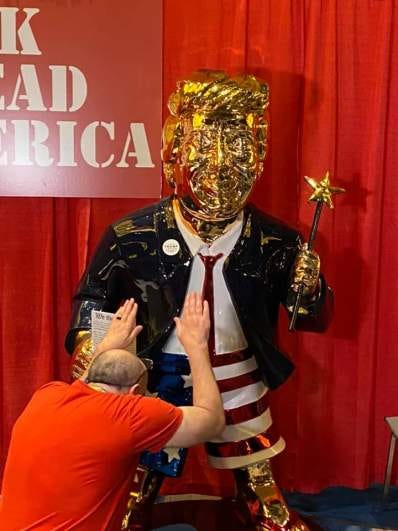
Because, with the exception of a few brave protestors, they didn’t say “no” when they could and should have.
And now, the rest of us are caught up in this whole gilded mess.
You know what you’ve got to do. Say no. Loud and clear. Don’t be scared. Be brave.
INSPIRATION
When Israel heard the fiery law,
From Sinai's top proclaimed;
Their hearts seemed full of holy awe,
Their stubborn spirits tamed.
Yet, as forgetting all they knew,
Ere forty days were past;
With blazing Sinai still in view,
A molten calf they cast.
Yea, Aaron, God's anointed priest,
Who on the mount had been
He durst prepare the idol-beast,
And lead them on to sin.
Lord, what is man! and what are we,
To recompense thee thus!
In their offence our own we see,
Their story points at us.
— John Newton, author of “Amazing Grace.” This poem is titled “The Golden Calf.”
PAID SUBSCRIBERS:
RUINING DINNER is on! TOMORROW, THURSDAY, APRIL 4 at 11:30 AM EASTERN, 8:30 AM PACIFIC.
Ruining Dinner is the irreverent, intergenerational, quirky theological podcast on religion and politics hosted by me and Tripp Fuller (of Homebrewed Christianity). Religion and politics may not be your thing, if that’s the case, don’t worry. Just skip it — there’s a wide variety of content at the Cottage. (But some people here love it!)
ALL PAID SUBSCRIBERS will get a link TOMORROW about two hours before the live conversation. If you can’t make the live broadcast, DON’T WORRY! The recording will be available to you afterward. Look for info in tomorrow’s email.
In February, The Cottage hosted a conversation for paid subscribers with Jim Wallis about his new book, The False White Gospel.
I greatly appreciated this book. It isn’t just a jeremiad about Christian Nationalism. Based on six specific Bible stories, it suggests a way forward for Christians into a practice of “civic discipleship” that is both helpful and hopeful.
It would be a good book for a 6-week adult education series in a church on religion and politics this coming fall — and it seems (to me at least) that it would work well in congregations that might be wary to address these concerns. He both understands the urgency of our democratic crisis and believes that good people can still be persuaded to embrace politics more in line with Jesus’ teaching.
A number of people in the paid community asked me to open this paywalled discussion up to everyone. Jim’s book released this week — I hope you’ll enjoy this and his book.

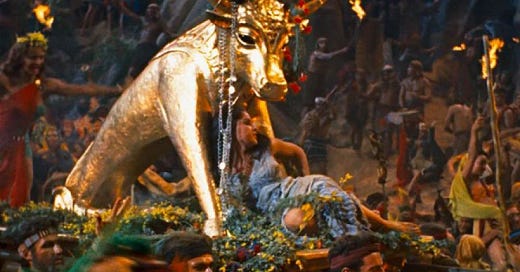


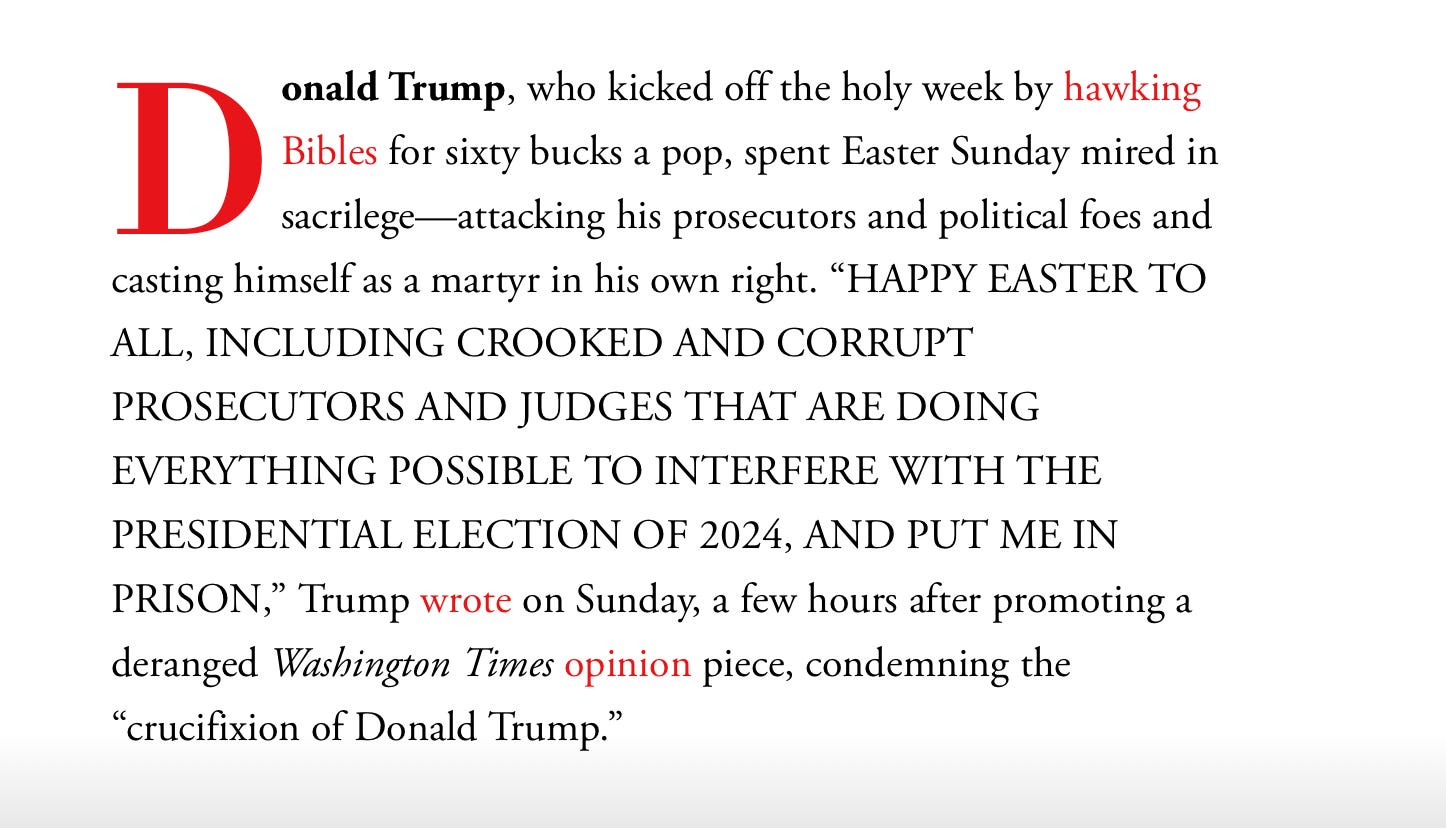
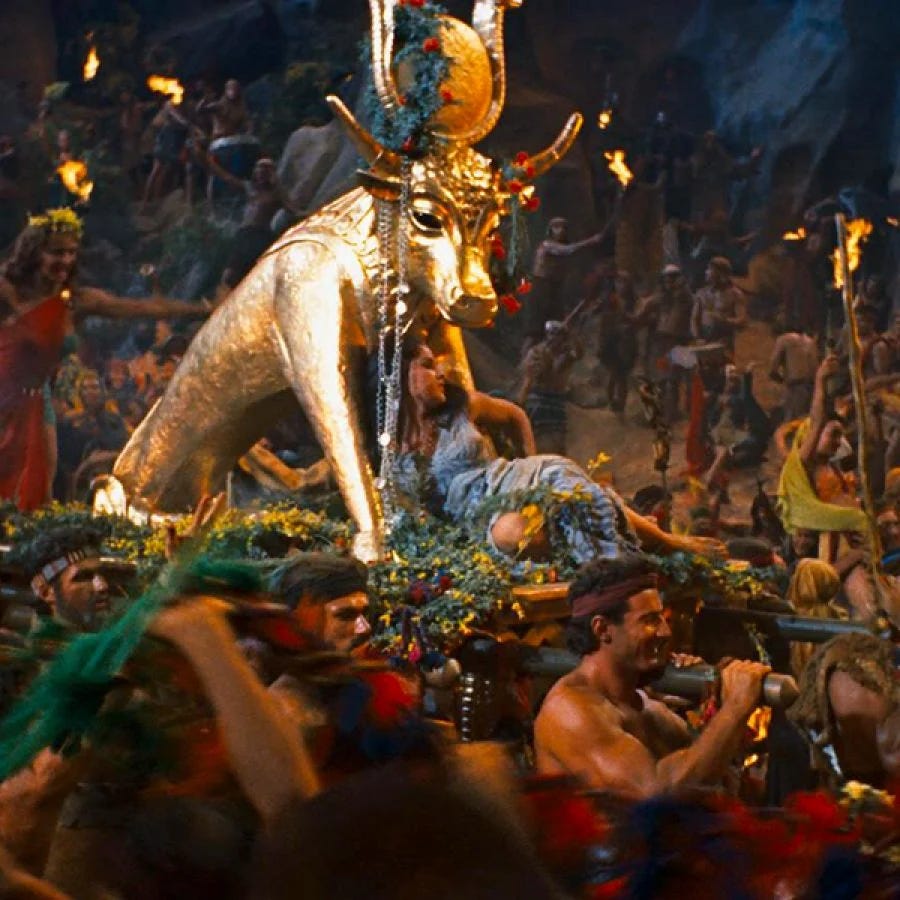





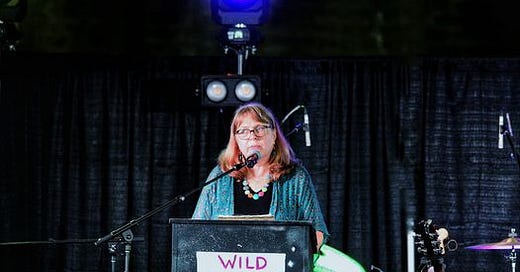



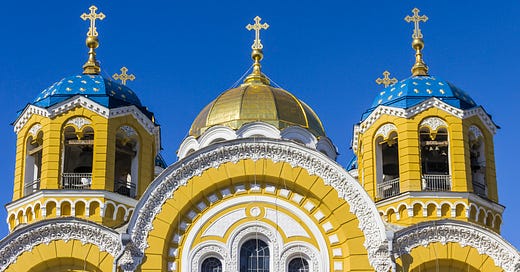

Thank you for this. While the MAGA/Trump movement is indeed about [White Nationalist] Christianity as well as about politics, the irony is that Trump himself is about neither; he is only about himself. He uses politics and religion for his own narcissistic goals. We see the evil, but Trump himself has no concept of evil (or of truth). It's all transactional to feed his narcissism. He drags politics and religion down into the gutter and we suffer the consequences while he could care less.
Wow! That’s a lot to unpack and I plan to break it down and read parts separately. Is it just me or is this SO heartbreaking? I feel like giving up sometimes but I absolutely know in my soul that this is not the time to quit.
My faith is stronger than ever, but I struggle to keep my outrage in check.Its hard to love these people when I feel evil in so much of their behavior and words. I just pray for grace and that they will see the truth.